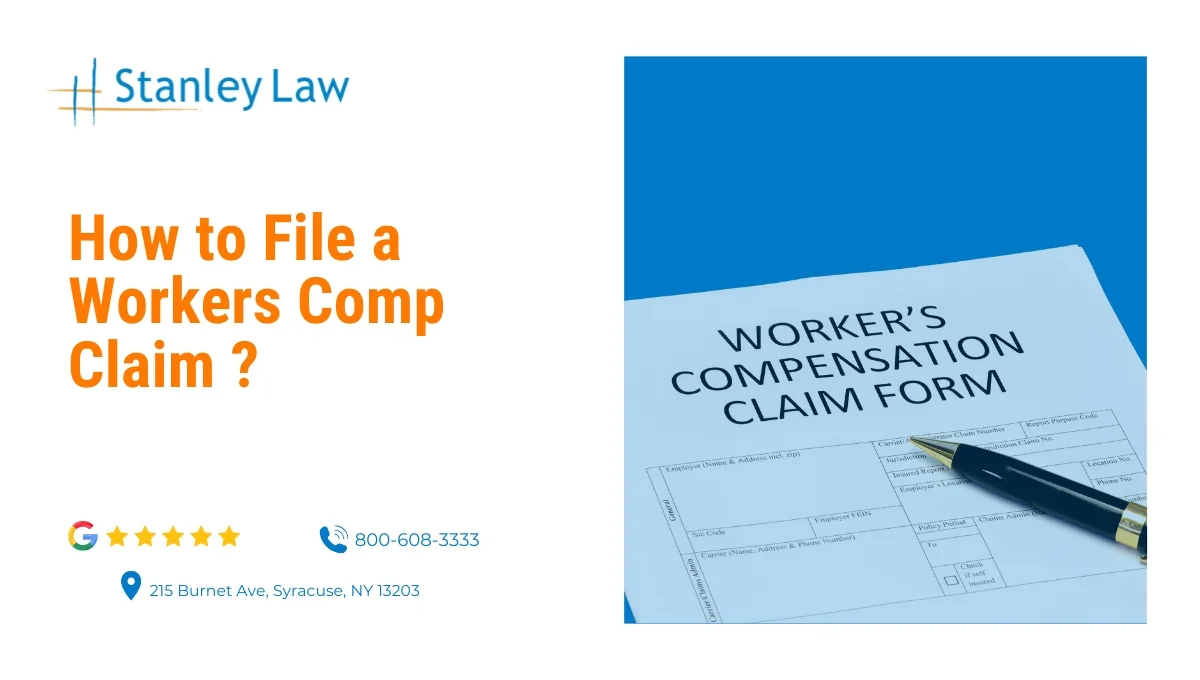Facing a workplace injury can be stressful, especially regarding medical bills and understanding your rights. Many people find the workers’ compensation process confusing and troublesome. This guide will clarify essential aspects of filing a claim, including eligibility, effective claim management, common mistakes to avoid, and tips for securing your benefits. With this information, you’ll feel more confident combating your workers’ compensation situation.
Understanding Workers’ Compensation
Workers’ compensation provides essential support for employees who get injured on the job. This section will explain workers’ compensation and discuss eligibility requirements, helping you determine if you qualify for benefits.
What Is Workers’ Compensation?
Workers’ compensation is insurance that benefits employees who suffer work-related injuries or illnesses. The main objectives include:
- Providing Medical Care: Covers costs of medical treatment for work-related injuries, ensuring you receive necessary care.
- Replacing Lost Wages: Offers partial wage replacement if you can’t work due to injuries, easing financial stress.
- Preventing Lawsuits: Creates a no-fault system, reducing the likelihood of lawsuits between employers and injured workers.
- Promoting Safety: Encourages employers to maintain safe workplaces to prevent future injuries.
Eligibility for Workers’ Compensation
To qualify for workers’ compensation, employees must meet specific criteria. Understanding these requirements can help ensure the proper filing of your claim. Here are the key eligibility points:
- Employment Status: You must be an employee (not an independent contractor) to file a claim.
- Type of Injury: Your injury or illness must be work-related and occur during employment.
- Timely Reporting: You should report the injury within the required timeframe, which varies by state.
- Medical Documentation: Provide proper medical documentation to support your claim.
By clearly understanding and meeting these criteria, you can strengthen your claim and improve your chances of receiving benefits.
Preparing to File Your Claim
Effective preparation is key to a successful workers’ compensation claim. Follow these efficient steps immediately after an injury to ensure everything is in order:
Essential Pre-Claim Actions
- Seek Medical Care: Immediately seek medical attention for your injuries. For example, if you sprain your ankle at work, visit the nearest clinic to get it checked and documented.
- Report the Incident: Promptly inform your supervisor about the injury. For example, if a machine malfunction injures you, report it to your supervisor and record it in writing.
- Document the Injury: Note the incident date, time, and any witnesses. For instance, if you cut yourself on a piece of equipment, record what happened and who was present.
- Collect Necessary Paperwork: Gather medical records and written communications regarding your injury. For example, save all medical visit summaries and emails to or from your employer.
The Comprehensive Process of Filing a Worker’s Comp Claim
Filing a workers’ comp claim requires attention to detail and timeliness to avoid unnecessary delays or denials. This section outlines the key steps and underscores the critical nature of meeting all deadlines.
Step-by-Step Filing Guide
To ensure a successful claim, follow these essential steps:
- Report the Injury: Notify your employer immediately to start the claims process; delays can jeopardize your eligibility.
- Seek Medical Treatment: Seek medical care promptly and document all visits. Delays can make your injury seem less serious and impact your claim.
- Complete the Claim Form: Complete all required forms accurately; incomplete submissions or missed deadlines can lead to rejection.
- Submit the Claim: Submit the claim form by the deadline to the correct board or insurer; late submissions can delay or deny benefits.
- Follow up: Monitor your claim status and respond quickly to requests for information; ignoring them can delay processing or close your claim.
Importance of Deadlines
Missing deadlines can harm your claim, causing delays or denials. Mark all relevant dates and set reminders. For example, late submission of the initial claim form can forfeit certain benefits, and delaying reporting to your employer may hinder proving the injury’s work-relatedness.
Do’s and Don’ts of Filing
Do’s
To strengthen your claim, focus on these essential actions:
- Seek Timely Medical Care: To build a solid medical record and address injuries quickly.
- Consult with an Attorney: Get legal advice if you have questions about your rights.
- Cooperate with Your Employer: Maintain open communication and provide necessary information.
- Keep a Journal: Document your recovery process, including symptoms and treatment, to support your claim.
- Understand Your Rights: Familiarize yourself with workers’ compensation laws in your state to know what you’re entitled to.
Don’ts
Avoid these common mistakes to protect your claim:
- Prioritize Your Health: Stick to medical advice and keep all appointments to aid your recovery.
- Discuss Your Case on Social Media: Keep details of your claim private to avoid jeopardizing it.
- Alter or Misrepresent Facts: Stick to the truth about your injury and circumstances to maintain credibility.
- Delay in reporting: Don’t wait too long to report your injury, which can affect your claim’s validity.

Managing Your Claim and Recovery After Submission
Managing your workers’ compensation claim after submission is key to getting your benefits. This section explains how to handle your claim, address disputes, and engage in the appeals process if needed.
After Submitting Your Claim
Once you’ve submitted your claim, stay proactive to ensure it moves smoothly through the review process:
- Claim Review: The insurance will evaluate your claim based on the submitted documentation and reports.
- Communication: Be ready for requests for more information; respond quickly to avoid delays.
- Monitoring and Compliance: Review all prescribed treatments and document your recovery progress to support your claim.
Handling Disputes and the Appeal Process
Disputes may arise for claim denials or if you’re dissatisfied with the decision. Here’s how to manage the appeal process:
- Understand the Denial: Read the denial letter to see why your claim was rejected, such as because of a lack of evidence or filing errors.
- Gather Additional Evidence: Compile supporting documentation, such as medical records, expert opinions, and witness statements.
- File a Formal Appeal: Submit a written appeal to the workers’ compensation board, meeting any state deadlines.
- Attend the Hearing: Prepare to present your case; consider hiring a workers’ compensation attorney if it’s complex.
- Follow Through: Comply with any requests from the board and monitor your appeal’s status.
Recovery and Compliance During the Process
Maintaining your health and adhering to prescribed medical advice is critical during this period:
- Adhere to Treatment Plans: Following your doctor’s orders aids recovery and strengthens your claim by showing commitment.
- Document Your Progress: Keep a detailed diary of your recovery and difficulties, as it can be crucial evidence for your claim.
A clear roadmap for handling disputes and appeals helps you handle workers’ compensation claims and advocate for your rights and benefits.
Employer’s Role and Responsibilities
Employers play an important part in the workers’ compensation process, helping injured employees receive the necessary support. This section highlights how employers can facilitate the claims process and implement best practices for a supportive workplace.
Supporting the Workers’ Compensation Claim Process
Employers can make the workers’ comp claim process smoother by:
- Prompt Reporting: Report injuries to the insurance carrier quickly to initiate the claims process.
- Providing Necessary Documentation: Ensure all required paperwork is available to support the employee’s claim.
- Maintaining Communication: Keep open lines of communication with injured workers to address their concerns and provide updates.
- Ensuring Compliance: Follow all legal obligations related to workers’ compensation, including safety measures and employee rights.
Best Practices for Employers
To create a supportive workplace for handling claims, employers should:
- Implement Safety Training: Conduct regular safety training sessions to prevent workplace injuries.
- Encourage a Supportive Environment: Create a culture where employees feel comfortable reporting injuries.
- Review Claims Processes: Regularly assess and improve the claims process for efficiency and fairness.
- Provide Resources: Access legal and medical resources to assist injured workers.
Additional Resources and Legal Assistance
Finding the right support is essential when dealing with the workers’ compensation process. This section offers information on helpful resources and when to consider seeking legal assistance.
Where to Find Help
Employees can access valuable resources related to workers’ compensation through:
- Workers’ Compensation Boards: Check your state’s board website for guidelines, claim forms, and updates on your claim status.
- Official Resources: Visit government websites for information on workers’ rights and employer obligations.
- Educational Materials: Explore online resources, such as articles and videos, that explain the workers’ comp claim process and employee rights.
Consulting with Legal Professionals
Consider reaching out to a lawyer when:
- Facing Disputes: If your claim is denied or challenged, legal assistance can guide you through the appeals process.
- Handling Complex Cases: Lawyers can help with claims that involve complicated medical or legal issues, ensuring you understand your options.
- Maximizing Benefits: An attorney can assist in negotiating fair compensation based on your situation.
Why Choose Stanley Law Offices
Selecting the right legal representation is vital for your workers’ compensation claim. Here are key reasons to choose Stanley Law Offices:
- Specialized Expertise: Our team focuses on workers’ compensation claims, ensuring effective representation.
- Personalized Service: We tailor our approach to fit your unique needs.
- Proven Success: Our track record shows favorable client outcomes in complex cases.
- No Win, No Fee: You pay nothing unless we win your case, making our services accessible.
Don’t face the workers’ compensation process alone. Contact Stanley Law Offices for expert legal support—your consultation is just a call away!
Contact a Workers’ Compensation Lawyer
If you face challenges with your workers’ compensation claim, don’t hesitate to seek help. Schedule a free consultation with a qualified lawyer for personalized guidance tailored to your situation. With expert support, you can better understand your rights and enhance your chances of securing the benefits you deserve. Contact us today to take the first step in protecting your rights and ensuring your recovery.

Conclusion
Addressing the workers’ compensation process is essential for securing the benefits you deserve. You can effectively manage your claim by familiarizing yourself with your rights and ensuring timely reporting and accurate documentation. Employers must also fulfill their legal obligations to support injured workers. If you face disputes or complex issues, consulting legal professionals can provide the guidance needed to protect your rights. For expert assistance, visit Stanley Law Offices, where we’re committed to helping you achieve the compensation you deserve.
How to File a Worker Comp Claim: Frequently Asked Questions (FAQs)
Can I File a Workers’ Compensation Claim If the Injury Was My Fault?
Yes. You can still file a claim even if the injury was your fault. Workers’ compensation provides benefits regardless of fault if the injury occurred during employment.
Can I File a Claim If I Was Injured While Working from Home?
Yes. You can file a claim for injuries sustained while working from home, provided they occurred during work hours and were related to your job duties.
When Should I Consult a Workers’ Compensation Attorney?
Consult a workers’ compensation attorney for claim denials, disputes, or questions about your case’s complexities.
What If My Injury Worsens After I’ve Filed a Claim?
If your injury worsens, inform your employer and medical provider immediately. You may need to update your claim to reflect the new medical condition.
Is There a Limit to How Long I Can Receive Benefits?
Yes. Usually, there is a limit on the duration of benefits, which varies by state and the nature of the injury. Understanding the duration of your specific benefits under your state’s laws is important.
Can I Appeal a Workers’ Compensation Decision?
Yes. You can appeal a workers’ compensation decision for claim denials or unsatisfied benefits awarded. The appeal process varies by state, so check local regulations for specific steps.

